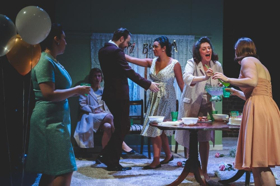Review: EUGENE ONEGIN, Arcola Theatre

![]() We're in the 'burbs under an early 1960s sun as the girls play 45s on their little Dansette: Olga, bubbly and bosomy; Tanya, bookish and brunette. Their mother, their ex-nanny and their neighbours busy themselves outside, the all-female atmosphere suffused with a kind of pleasant ennui, as if everyone is waiting for The Beatles - or Women's Lib.
We're in the 'burbs under an early 1960s sun as the girls play 45s on their little Dansette: Olga, bubbly and bosomy; Tanya, bookish and brunette. Their mother, their ex-nanny and their neighbours busy themselves outside, the all-female atmosphere suffused with a kind of pleasant ennui, as if everyone is waiting for The Beatles - or Women's Lib.
The spell is broken by a Fab-enough two, Lensky, who is courting Olga and his tall, handsome, slightly mysterious friend, Onegin, for whom Tanya falls head over heels. Fired by first-love passion, that night she sets aside her natural caution and writes him a long letter confessing her love, but, in a tryst, he explains that, despite his strong feelings, it just can't be.
At Tanya's 18th birthday party, things are a little awkward between herself and Onegin and, perhaps recognising that, Olga dances with Onegin - and she dances quite a lot. Lensky looks on, believing that his girlfriend and best friend are deliberately humiliating him and, boozed up, flies off the handle terminating his friendship with Onegin and demanding satisfaction in a fight. They do that - and it doesn't end well.
OperaUpClose have pared back Tchaikovsky's work for a cast of ten and a band of four, but Robin Norton-Hale's English libretto and Alison Holford's new orchestration pack the opera's tragedy into the Arcola's Studio 1 with great skill and sympathy. And, crucially for me, I found myself on at least a couple of occasions whispering, "This is so Russian!" into my son's ear.
Of course, duelling is very much on trend in London's theatre scene at the moment - the writer of the novel on which the opera is based, Alexander Pushkin, has recently been demoted to second in the list of famous people called Alexander who died in such circumstances.
The music is delivered with all the requisite light and shade, Holford's own cello doing much of the work to suggest the storm clouds gathering on even the sunniest of days. The singing is never less than wonderful to hear, but suffers a little in the harmonies in a space full of hard surfaces and exposed brick - not so much that it should put off anyone who is short of 50 attendances at the Royal Opera House though.
The acting is top notch too. Lucy Hall and Felicity Buckland convince entirely in their sisterly closeness but temperamental difference, with Hall's coquettish simpering just the right side of soppy on her first encounter with Onegin, making her behaviour in the final scene (now a wealthy, successful author in this version) all the more powerful - this is as much the story of Tanya's sentimental education as it is the tale of Lensky's jealousy.
Tom Stoddart and Anthony Flaum are excellent throughout, really coming into their own in their extremely realistic knife fight (super work from Joe Wild). Flaum is sensational when agonising about his challenge and how he is trapped into proceeding by his code of honour - Lensky's aria is the standout moment of the show.
I left amazed, and not for the first time, about how so much Russian art is so rooted in the art of Western Europe, and yet so very different - the soul of Russia, its snow, its vastness, its brutal history ever-present. It's there in every note and every word of this fine production which is, as ever with this company, an opera that will delight the form's aficionados and tyros alike.
Eugene Onegin continues at the Arcola Theatre until 23 December.
Reader Reviews
Videos

